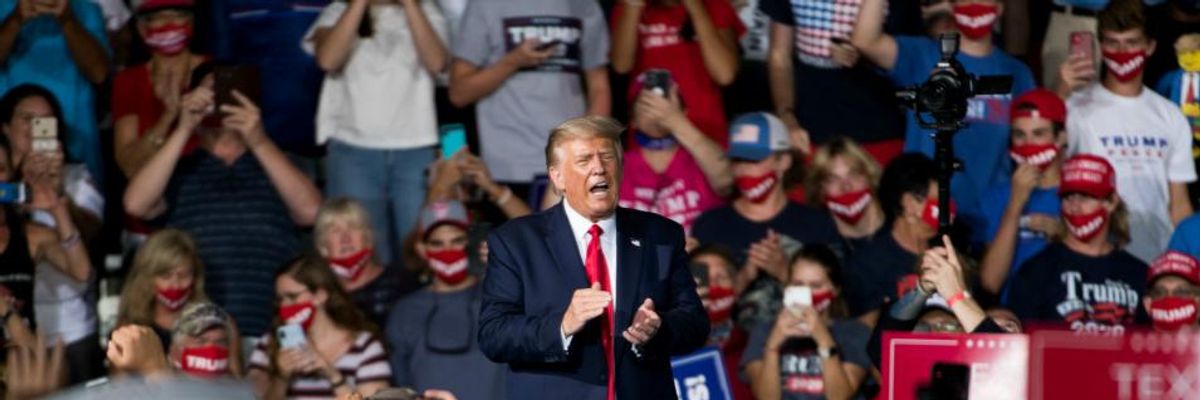After refusing to say whether he has tested negative for Covid-19 since his diagnosis late last week, President Donald Trump told Sean Hannity of Fox News Thursday night that he is hoping to hold a pair of in-person rallies this coming weekend in the key battleground states of Florida and Pennsylvania despite the potential risk of spreading a virus that has now killed more than 212,000 Americans on his watch.
"I'll tell you, I took this Regeneron, it's phenomenal," Trump said, blowing past Hannity's question about whether he has recently tested negative for Covid-19. "Eli Lilly has something very comparable, it's phenomenal. It's a whole new day."
When asked later in the interview if he's had a coronavirus test since his diagnosis, Trump said, "Well, what we're doing is probably the test will be tomorrow, the actual test, because there's no reason to test all the time. But they found very little infection or virus, if any. I don't know that they found any--I didn't go into it greatly with the doctors."
Watch:
Amid ongoing questions about the president's condition following his release from Walter Reed National Military Medical Center on Monday, White House doctors and administration officials have repeatedly declined to say when Trump's last negative coronavirus test was, prompting concerns that the president is still contagious and poses a risk to others.
"I don't want to go backwards," White House physician Dr. Sean Conley said Monday when asked about the president's last negative test result. White House Deputy Press Secretary Brian Morgenstern told reporters that he doesn't know when the president last tested negative for the coronavirus and is not interested in finding out.
"We're not asking to go back through a bunch of records and look backwards," Morgenstern said, parroting Conley's line.
In a brief memo on Thursday, Conley--who has come under fire for evading reporters' questions and omitting crucial information during his briefings on the president's condition--wrote that "based on the trajectory of advanced diagnostics the team has been conducting," he believes Trump will be able to safely "return to public engagements" as early as Saturday.
But public health experts immediately voiced skepticism in response to Conley's proposed timeline. Dr. Leana Wen, an emergency physician and visiting professor of health policy and management at the George Washington University's Milken School of Public Health, said she was "stunned" by Conley's claim that the president is nearly ready to return to public activities.
Saturday is "day 10, according to White House's own time course," Wen noted. "Patients with severe Covid-19 can be infectious for 20 days."
Dr. Krutika Kuppalli, an infectious-disease physician based in South Carolina, told the New York Times Thursday that while "everyone is going to have a different point of view," he would "err on the safe side, and keep [Trump] isolated for 20 days."
The Centers for Disease Control and Prevention recommends that "for most persons with Covid-19 illness, isolation and precautions can generally be discontinued 10 days after symptom onset and resolution of fever for at least 24 hours, without the use of fever-reducing medications, and with improvement of other symptoms." Based on the White House's public statements, it's unclear when Trump began showing coronavirus symptoms.
"This is bigger than him," Kuppalli said, alluding to the public health risks associated with the president resuming public events.




